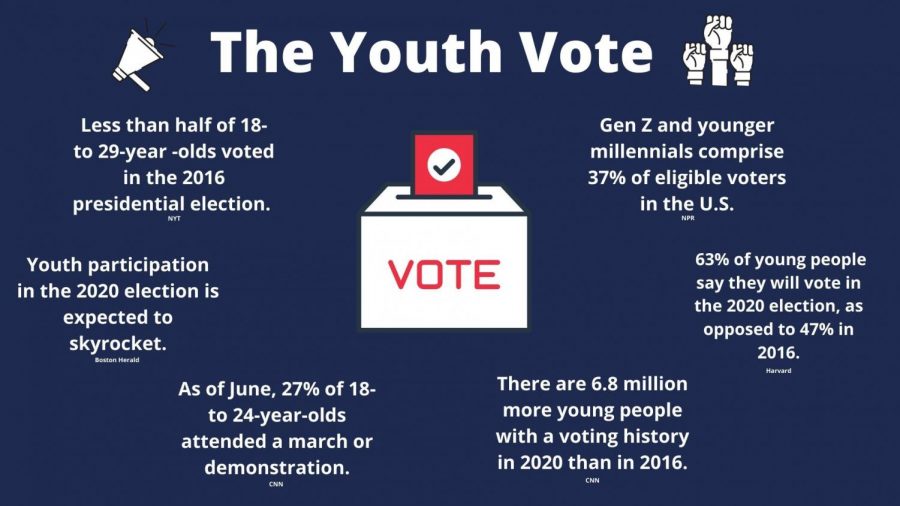Students voice opinions in upcoming election
Despite differences of opinion, students agree on importance of using voice to vote
Voting trends for young people haven’t had a great track record in U.S. history. Young people often aren’t inclined to participate in government or politics, but the 2016 election appears to have incited civic participation in the younger generations.
October 27, 2020
Tuesday’s upcoming election has been the source of an outpouring of opinions from United States citizens. Like the general population, Gannon University students have a variety of opinions and issues that affect their vote.
Emily Lynch, a freshman theatre major, has already voted via mail.
“I already voted as I knew I wouldn’t be able to go back home to vote on Election Day, so I voted by mail a couple weeks ago,” Lynch said.
Lynch voted based on issues like reproductive rights, LGBTQ+ rights, health care access and the environment.
“I think it’s really important for young people to be involved in politics to some extent,” Lynch said. “We make up such a large part of the eligible voting population and we should have our voices heard.”
Annie Ruzanic, a sophomore nursing major, also voted based on similar issues.
“I’m mainly voting for environmental protection and avocation, LGBTQ+ rights, racial justice, affordable and accessible health care for all, and the protection of women’s rights and Roe v. Wade,” Ruzanic said.
Anthony Constantino, a freshman secondary education major, is voting to maintain a sense of unity in the United States.
“The biggest issue I vote for is having a leader who will unite the country and not divide it,” Constantino said. “I also vote for climate control, Medicare for all and equal opportunity for everyone regardless of ethnic background, gender or socioeconomic status.”
Ryan Gerenser, a junior business management major, voted largely based on security and defense. For Gerenser, this is multifaceted and includes topics such as border security, financial security and protection from illness.
“Defense from disease goes further than just COVID-19; it’s finding new and innovative ways to combat cancer and reducing prices in prescription drugs,” Gerenser said. “There are a lot of good people out of work and if we are forced to not work by the government, we should be paid for what we aren’t allowed to do.”
Gerenser said that according to NBC, the cost of illegal immigration was estimated to be $54 billion per year. Gerenser is voting on this precedent as well.
“I believe that all people are important no matter their walk of life; however, there is a process and there are laws,” Gerenser said. “This money should be spent on the poor in our country and struggling veterans and families.”
Samantha Zaphiris, a freshman nursing major, is voting based on the issue of health care in relation to COVID-19,
“I believe that during a global pandemic where millions have lost health insurance while becoming sicker that we need drastic progressive health reform,” Zaphiris said.
Zaphiris also elaborated on the importance of jobs and environmental reform.
“I believe that these issues are not mutually exclusive, and that we can build our economy while nurturing the environment,” Zaphiris said. “We will not have jobs, nor futures for our children if we continue the dangerous path of climate recklessness we are headed down.”
Matthew Schlessman, a junior chemistry pre-dental major, is voting based on the nomination of a new Supreme Court justice, the COVID-19 pandemic and unity.
“The president must act swiftly to save American lives and ensure the best for their citizens,” Schlessman said. “Politicians need to move past the political parties and voice the people they represent no matter what political party, race, sexual preference or religion they may be.”
Philip Vargo, a senior business administration major, is voting solely based on policy.
“Policy encompasses so many other areas of importance, like health care and the economy,” Vargo said. “Ultimately, I believe that each candidate’s policies will be pivotal in shaping the future of our country in one way or another; specifically, our recovery from the pandemic, and relative to so many soon-to-be college graduates like myself, the job market.”
No matter what candidate or political party one supports, it is important to vote, Schlessman said.
“Nov. 3 is the day to elect new officials that you see fit, so make a plan to go vote and exercise your right to do so,” Schlessman said.
ANNA MALESIEWSKI






